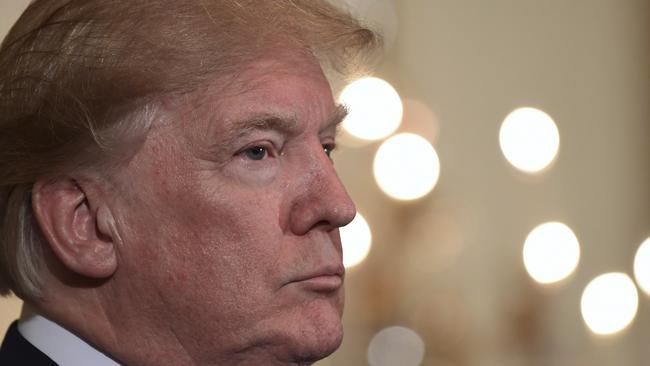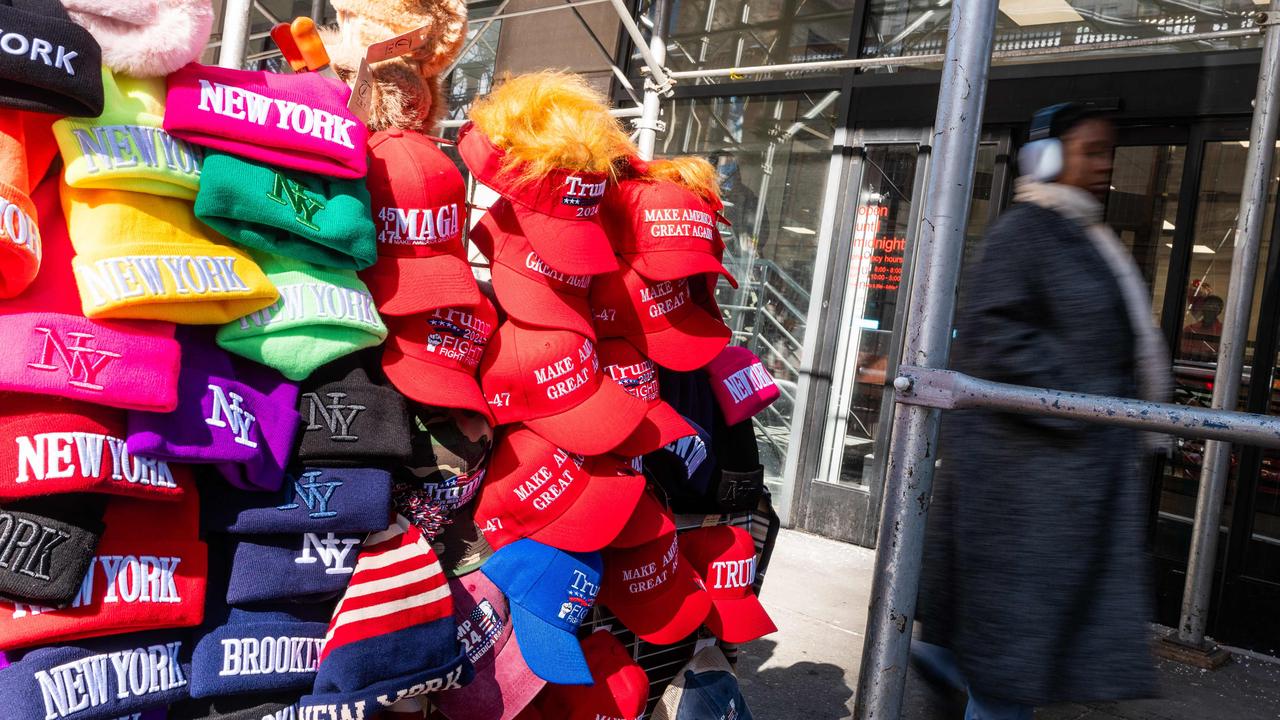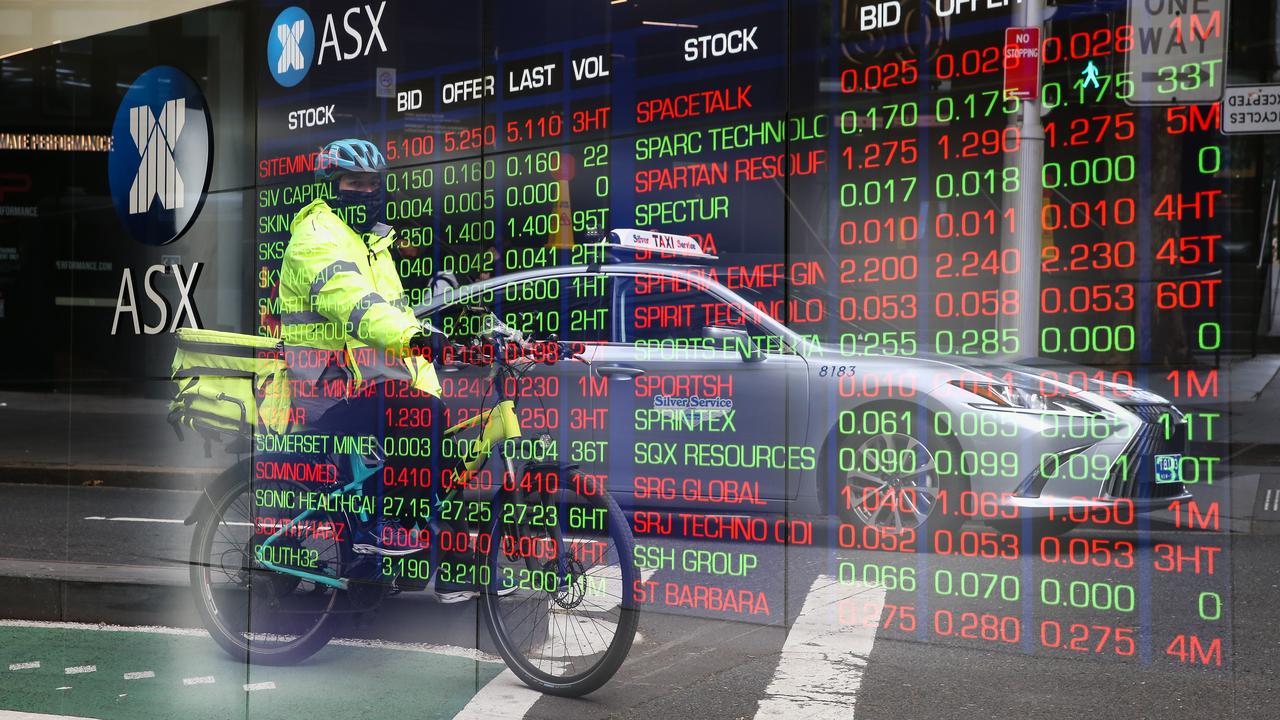Local stocks take $35bn hit on trade war fears
The ASX has booked its worst session in six weeks after the US hit China with new tariffs and Beijing threatened retaliation.

The local sharemarket has weathered its biggest fall in six weeks, as revived fears of a global trade war helped wipedaround $35 billion off the market’s value.
At the close of trade, the benchmark S&P/ASX200 had dived 116.45 points, or 1.96 per cent, to 5,820.7 points, while the broader All Ordinaries index dropped 114.21 points, or 1.89 per cent, to 5,929.0 points.
It came after Wall Street tumbled overnight and volatility spiked after US president Donald Trump unveiled a plan to impose $US60bn of new tariffs on China, saying it would be the “first of many” trade actions.
In a separate move, the US president also suspended steel and aluminium tariffs on imports from a number of countries including Australia, until May 1.
The sharp fall extended to other Asian markets and at 4.23pm (AEDT), Japan’s Nikkei was down 4.32 per cent, the Hang Seng had fallen 2.77 per cent and the Korean benchmark index had lost 2.68 per cent. Chinese markets were also deep in the red, with the Shanghai Composite down 3.87 per cent.
“Markets retreated due to the elevated threat that a trade war may break out after China retaliated against Trump’s tariffs announced overnight,” said Moody’s economist Katrina Ell.
“A lot of the economies in Asia are really export oriented and they are really going to suffer.
“It’s likely that if the Trump administration keeps baiting China, that China will go harder and that will send stock markets even lower.”
In financials, Commonwealth Bank lost 2.75 per cent to $72.81, while Westpac shed 2.53 per cent to $28.85. ANZ slid 1.7 per cent to $27.70, while NAB weakened 1.66 per cent to $28.97.
The major iron ore miners dived, as the resources sector lead the bourse lower.
BHP plunged 3.13 per cent to $28.77, while Rio Tinto tumbled 4.35 per cent to $73.44 and Fortescue dropped 2.92 per cent to $4.65.
“The weakest sector is the resources sector because that sector will be the most impacted,” said Tribeca Deputy Portfolio Manager Jun Bei Liu.
“Low growth will mean the demand for commodity products will be low which means all these resources earnings will be impacted so they are the weakest sector today and they will probably be under more pressure in the following days.”
The energy sector backtracked on the back of a weaker oil price.
“This week’s EIA report showed an unexpected fall in US crude oil inventories, as well as in gasoline and distillates,” said ANZ FX strategist Giulia Specchia.
“Another strong week of exports from the US continues to tighten the market. Supply-side risks were in the spotlight after reports that Shiite rebels in Yemen had fired at an oil facility in Saudi Arabia.”
Origin Energy sank 2.61 per cent to $8.95, while Oil Search lowered 1.24 per cent to $7.14. Santos dropped 0.97 per cent to $5.08, while Woodside Petroleum slipped 0.34 per cent to $29.34.
Meanwhile, the gold miners made gains as investors sought safety in safe haven-linked securities.
Resolute Mining shot up 3.25 per cent to $1.27, while Northern Star lifted 1.04 per cent to $6.78. Newcrest added 0.97 per cent to $19.86, while Evolution Mining made 0.33 per cent to $3.05.
The Australian dollar was trading slightly higher at US77.10 cents in late trade.
It came after Wall Street plunged more than 700 points following the White House moved to hit China with tariffs on up to $US60bn of goods.
Mr Trump’s move was swiftly denounced by Beijing, which vowed to “fight to the end” if the United States persisted in the confrontation.
China's Commerce Ministry called on Washington to negotiate a settlement as soon as possible but set no deadline. A ministry statement said the higher US tariffs “seriously undermine” the global trading system.
“The Chinese side urges the US side to resolve the concerns of the Chinese side as soon as possible,” the ministry said. It appealed for dialogue “to avoid damage to overall Chinese-US co-operation.”
Prime Minister Malcolm Turnbull called the Trump tariff hikes a negotiating tactic, adding: “We look forward to the US and China being able to negotiate a satisfactory arrangement that suits both sides.”
Overnight, the Dow Jones Industrial Average fell 2.9 per cent to close at 23,957.89 after a rocky session.
The broadbased S&P 500 dropped 2.5 per cent to end the day at 2,643.69, while the tech-rich Nasdaq Composite Index fell 2.4 per cent to finish at 7,166.68.
The losses marked the biggest daily percentage drop for each of the major indexes since February 8.
Saying it would be the “first of many” trade actions, Mr Trump signed a presidential order to retaliate for China’s “theft” of American intellectual property.
Beijing vowed to defend its interests, setting the stage for dreaded tit-for-tat conflict that analysts fear could harm both countries as well as the global economy just as it is recovering.
Analysts also cited other factors behind the big overnight drop in the US, including unease over Federal Reserve’s plans to raise interest rates under new chairman Jerome Powell, and worries that a data scandal involving Facebook could spur heavy-handed regulation of the fast-growing technology sector.
Investors also took note of news of the departure of John Dowd, a top lawyer on Trump’s team in the Russia investigation led by special counsel Robert Mueller, and the replacement of security adviser HR McMaster with hardliner and former UN Ambassador John Bolton.
With AAP, AFP




